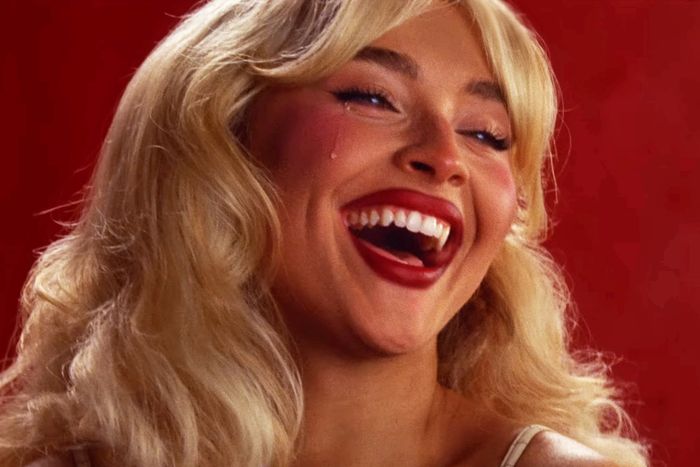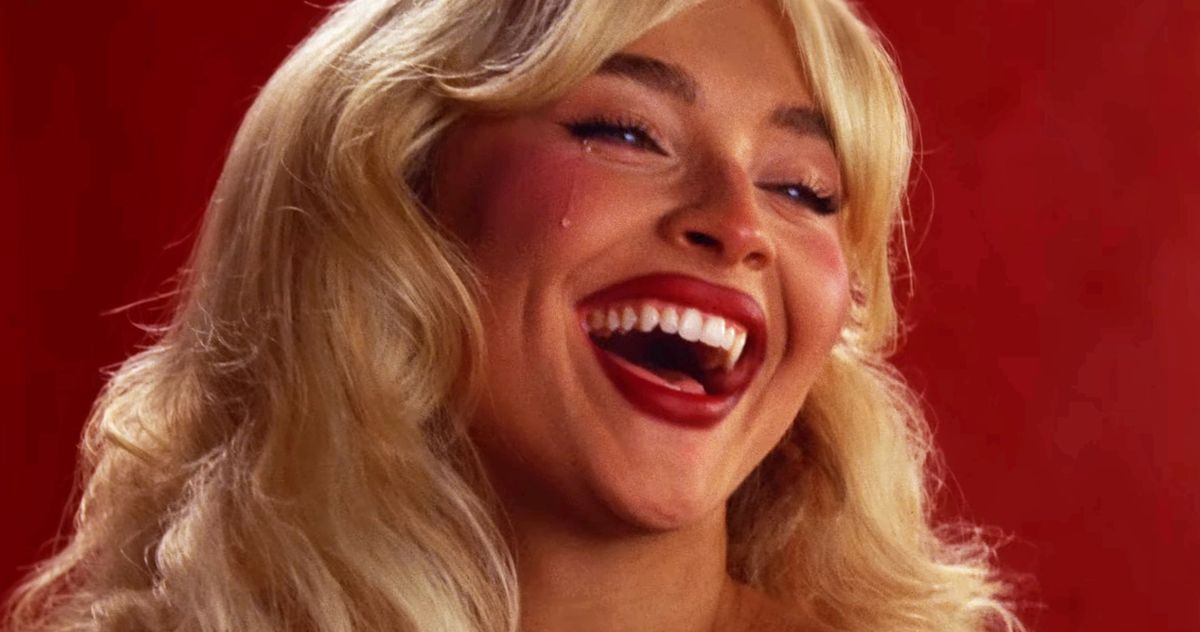
Man’s Best Friend is one of the breeziest, silliest, and rudest event-pop albums of the year.
Photo: Sabrina Carpenter via YouTube
Sabrina Carpenter is, sometimes accidentally but more often on purpose, a lightning rod, the kind of pop star whose art and humor consistently get hoovered up into the overarching fights over women’s promiscuity and desirability. She has long been a familiar face, a 26-year-old industry vet with credits everywhere from the Disney Channel’s Phineas and Ferb to Netflix’s Tall Girl, and a singer-songwriter who has journeyed through genteel folk- and dance-pop. It took her five albums to land on a sound that made her music career feel like the main focus. Connecting to the masses was as much a succession of colorful controversies and nontroversies as it was a timely marriage of folksy Americana’s peanut butter and randy pop music’s jelly. It is widely assumed that Carpenter is “that blonde girl” who stole Joshua Bassett from Olivia Rodrigo in 2021’s “drivers license,” and in 2023, a Brooklyn Catholic bishop was relieved of his duties for letting Carpenter film a tantalizing dance routine for her “Feather” video in a real church. She continues to catch flak for touring last year’s successful Short n’ Sweet in a blue teddy and regaling audiences with sexually suggestive but often unserious lyrics and dances.
A troll simply riffing on that heat — “I’m 17 and AFRAID of Sabrina Carpenter when she’s performing” — can get blasted across the internet, instantly minted as comical copy pasta for pop fans. Her history, our ballooning interest in her more overtly sensual work, and the very contours of her face have all been fodder for intensifying debate. Many who’ve observed Carpenter’s trip from 2016’s Adventures in Babysitting remake to songs like 2024’s sweetly villainous “Taste” — “You’ll just have to taste me when he’s kissing you” — hold her new persona up as proof that sex sells. Behold the wholesome, impressionable child star from Pennsylvania who went from placing third in The Next Miley Cyrus Project in 2008 to molding art and body to meet an oversexed societal mandate.
“I’m 17 and AFRAID” had legs because millennials feel zoomers are laughably sex-negative. Ideological skirmishes over the motives and obligations of Carpenter’s music include both sincere interrogation of its feminism and smirking counteractive reprisals to that scrutiny. It’s easy to ignite a smoldering batch of think pieces and podcast rebukes in the year of conservatives making Sydney Sweeney an emblem of imagined liberal outrage. Trained to look for darker, deeper meanings in media in a dizzying authoritarian rush that sees sway over entertainment as a trophy, we are uniquely susceptible to the wiles of any trickster pushing buttons toward a larger theatrical takeaway. This is Sabrina Carpenter’s wheelhouse. In June, she released the artwork for her seventh album, Man’s Best Friend: a grainy still that shows the star crouched like a cat staring blankly before the silhouette of a man grabbing her hair. The photo attracted an angry response that the album’s lyrics suggest is misguided. Really, the album is about tiring of mothering men who are great in bed but lack crucial social skills. The posturing in it is more dom than sub. It is one of the breeziest, silliest, and rudest event-pop albums of the year.
You can barely make it to the end of one of the new songs without getting the feeling that Carpenter considers love interests a bit of a nuisance. The pillow talk on Man’s Best Friend often takes the curt, assertive tone of a person reproaching a precocious pet. “Why so sexy if so dumb?,” lead single and album opener “Manchild” quips. Where you think you’re getting typical pop-star-yearns-for-affection fare, she introduces a nagging wrinkle. “My Man on Willpower” reveals its classical industrious male to be a bore: “He’s busy, he’s working, he doesn’t have time for me / My slutty pajamas not tempting him in the least.” “Tears,” a frothing disco track, hooks with a shock-value opening line — “I get wet at the thought of you” — before ticking off an increasingly pithy list of qualities that get her going: “Remembering how to use your phone gets me oh so, oh so, oh so hot.” It’s all a raunchy inversion of the sexual politics her critics, which now include right-wing media personalities, presumed she supported after a glimpse at the cover. Her albums and photos seem to toy specifically with the reading that she’s in thrall to someone else.
Carpenter’s pivot from moonlighting in wan folk-pop and trop-house bops to topping international charts is due in part to a steamier approach conveniently timed to her signing to Island Records in 2021. She dips assertively into the 2020s nostalgia pop wave responsible for Dua Lipa, Miley Cyrus, and Benson Boone singles that nip at the heels of Olivia Newton-John’s “Physical.” But she’s not living in the ’80s of sparkly New Wave, like big hits from Harry Styles and the Weeknd, or synth-y Springsteen, like Swift’s The Tortured Poets Department and Selena Gomez’s “Sunset Blvd.” It’s the ’80s of gossamer Dolly Parton and Kenny Rogers duets, of prerequisite toplessness in coming-of-age comedies like Porky’s, of news reports about broken-windows policing and the cat-and-mouse game between city vice squads and sex workers. The GIF set gracing Man’s Best Friend’s official lyric videos shows additional scenes from the cover art that, like Sweeney’s jeans-gate, bear some resemblance to the 1980 Calvin Klein campaign that drew ire for 15-year-old Brooke Shields reading a “come” pun. Carpenter seems to be inviting a similar reaction: Look what you made Maya Hart from Girl Meets World do.
Man’s Best Friend’s dewy charm/smarm offensive also seems purposely set to so much country music, a field shaped by its key artists’ and core audience’s Christian family values. The album only passingly cares about the signature dance-pop gunk of its 2010s and ’20s peers and forebears and doesn’t (like songs by Gomez, Addison Rae, and others) spend much time exploring Lana Del Rey as a subgenre. Subverting traditional values and joining points of reference that bristle against each other is of far greater interest. The soaring “Fuck my life” in the chorus of “Manchild” wants what brassy country shout-alongs of the past like Loretta Lynn’s “The Pill” or Gretchen Wilson’s “Redneck Woman” had.
The “Is Mastercard a queer ally?” lens, which seeks to stick an ideological label and political orientation on a piece of Pop Art, while understandable in a post-Roe America, is a stance this album’s humor anticipates. Carpenter keeps killing the boyfriend in her music videos while under scrutiny for appealing to the male gaze. What she aims to do with our attention is less important to both wings of her backlash than the fact that it can be earned on all fours. The artist’s intent is assumed and assigned here by the audience. Agency, be damned. But surface readings are dry: Yes, this is a very post–Taylor Swift case of a Pennsylvania country-pop crossover artist tapping literal Jack Antonoff to skew more adult in lyrics that could be flaming a famous ex. (It seems like Barry Keoghan is catching hell.) Yes, the suggestive dance routines indicate Carpenter really studied Miley Cyrus’s Bangerz-era twerk heard round the world.
She pitches into her predecessors’ orbit following a stint as opener on the Eras Tour, but diverges notably in unsubtle lyrical carnality and elsewhere. She doesn’t share their struggle to reconcile rural and metropolitan markets, their mulling over whether to ditch or lean into a country past. Man’s Best Friend doesn’t fish for a sense of danger or unbridled freedom with trappy ambience, like “Vigilante Shit” or “We Can’t Stop.” But it does take aim at the stuffy continuum of using pop stars as proof of social decline, delivering a rug pull for the condescending “Sarahs and Hannahs” Swift skewered in Poets’ “But Daddy I Love Him.” The album excels on two fronts as a rip-roaringly dirty trip down late-night adult-contemporary lane and a shibboleth sniffing out who’s really paying attention to the actual messages in the media we war over.
Correction: A previous version of this article credited “The Pill” to the wrong artist. We regret the error.
Sign up for The Critics
A weekly dispatch on the cultural discourse, for subscribers only.
Vox Media, LLC Terms and Privacy Notice
Related

